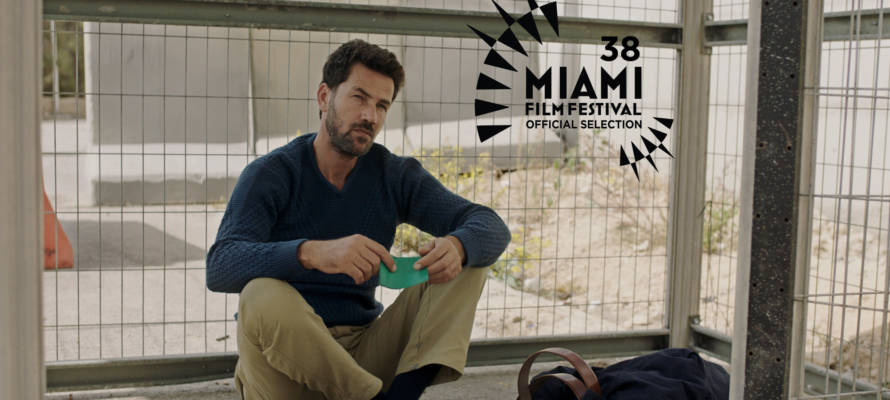The Palestinian people, whom the filmmaker claims to care about and for whom she is raising awareness, will not benefit from such blatant anti-Israel propaganda. Rather, the truth would be helpful.
By Sheri Oz, United with Israel
If the Palestinian candidate wins in the category of Live Action Short Films at the “Oscars” on April 26, it will be a win for lies and the promotion of hate against the Jewish state.
The Present tells the story of gratuitous humiliation faced by Yusef and his young daughter Yasmin when they walk from their home to a neighboring village to buy an anniversary gift for Yusef’s wife. The main role is played by well-known actor, Haifa resident Saleh Bakri. Mariam Kanj as Yasmin steals our hearts.
British-Palestinian Farah Nabulsi co-wrote, directed and produced the film. In spite of the fact that she declared in several media interviews that the film is a true depiction of life for the Palestinians under Israeli “occupation,” it is not difficult to contradict that claim.
For example, Nabulsi says that the film focuses on just one of over 100 checkpoints that exist within the West Bank (Judea and Samarai). This is simply not true. Even the left-wing NGO B’Tselem, which works to change Israeli policy in Judea and Samaria, recognizes that today there are fewer than 11 permanently manned and 25 intermittently manned checkpoints in the region (not counting Hebron, which is a special case). It also acknowledges that movement through the permanently manned checkpoints is now generally smooth and security checks are only randomly conducted.
Israeli-Arab businessman Ahmed (not his real name), who travels often in the Palestinian Authority, told United with Israel (UWI) that “because they are generally not consistently manned, the inconvenience is minimal.”
Similar statements have been uttered by many when they have promises of anonymity. Therefore, suggesting that checkpoints such as the one in The Present is representative of the reality of daily life in the Palestinian Authority is an outright lie.
The very first scene in the film shows the protaganist Yusef moving through Checkpoint 300. Since it is likely that Nabulsi would not have received permission from Israel to film at that site, she took a chance and shot it without a permit. Called guerrilla filmmaking, this clip has nothing to do with the rest of the movie except to arouse in the audience a “deliberate emotional reaction,” which is precisely the purpose of such embedded images, explains Dr. Sandra Alfonsi, Senior Academic Fellow at Truth in Textbooks. This sets the tone of the entire film.
Indeed, Nabulsi clearly states in interviews that she does not set out to entertain, but “to raise global social conscience.”
In The Present, it seems that the soldiers at the checkpoint could not do enough to thoroughly humiliate Yusef. One of them cocks his rifle at Yusef and his daughter. For no apparent reason, the Israelis then put him into a cage, about 3m by 3m in size, with his daughter having to sit on the ground beside the cage. Finally they let him pass.
There is nothing that feels authentic here. First, since Yusef works in Israel. he almost certainly speaks Hebrew and would not converse with the soldiers in English. Second, the Israeli army has worked at eliminating debasing behaviors on the parts of soldiers by having older reservists serving together with their younger peers, who are still essentially teenagers. The older reservists are more mature, show more patience and serve to ground the young soldiers who may be nervous and scared. Third, Palestinians crossing through checkpoints are not put in holding cages.
Fictitious Depiction of IDF Soldiers
In conversation with UWI, Ahmed said that in his experience, it is nonsense to claim that those passing through the checkpoints are humiliated. “The soldiers are polite, say hello, have a good day, thank-you.”
Regarding the cages, Ahmed told UWI it’s an out-and-out lie. So did Efrat Mayor Oded Revivi, Chairman of Israel Media Watch Ziv Maor, and Daliat-el-Carmel City Counselor Samer Birani, who were adamant that such cages do not exist.
As an officer in the IDF who has served many times in the reserves as squad commander at checkpoints, Birani says that the depiction of IDF behavior in The Present is fictitious, adding that Arabs passing through the checkpoints generally do not speak English. In fact, many do not speak Hebrew either, and for that reason, unlike in The Present, there is at least one Arabic-speaking soldier on duty at all times.
Birani says the soldiers should have been wearing their helmets at all times, but perhaps most important, it is against IDF regulations to cock a weapon without first saying, in Arabic, something meant to stop a potential assault. Yusef did nothing implying intent to hurt the soldier, who most likely would have faced disciplinary action for such abusive behavior.
Yet the sound of the rifle hammer, and seeing it pointed at a father and his sweet daughter, certainly emits a strong emotional charge and therefore had an important part to play in this Israel-bashing film.
The Present may be winning prizes, but the Palestinians Nabulsi claims to care about will get no benefit from such films. If she finds guerilla filmmaking rewarding, perhaps she should try filming Palestinians at demonstrations against their own government. Or perhaps she could interview family members of journalists detained without trial and tortured in Palestinian jails because they dared to try to tell the truth about corruption in the Palestinian Authority.
Surely there are many film-worthy topics about life in the PA that would actually be true and would do more to promote Palestinian welfare than this overly sentimental, anti-Israel film.
